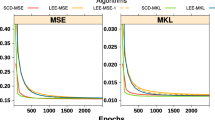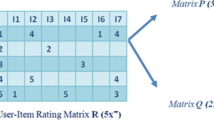Abstract
The rapid development of online services and information overload has inspired the fast development of recommender systems, among which collaborative filtering algorithms and model-based recommendation approaches are wildly exploited. For instance, matrix factorization (MF) demonstrated successful achievements and advantages in assisting internet users in finding interested information. These existing models focus on the prediction of the users’ ratings on unknown items. The performance is usually evaluated by the metric root mean square error (RMSE). However, achieving good performance in terms of RMSE does not always guarantee a good ranking performance. Therefore, in this paper, we advocate to treat the recommendation as a ranking problem. Normalized discounted cumulative gain (NDCG) is chosen as the optimization target when evaluating the ranking accuracy. Specifically, we present three ranking-oriented recommender algorithms, NSMF, AdaMF and AdaNSMF. NSMF builds a NDCG approximated loss function for Matrix Factorization. AdaMF is based on an algorithm by adaptively combining component MF recommenders with boosting method. To combine the advantages of both algorithms, we propose AdaNSMF, which is a hybird of NSMF and AdaMF, and show the superiority in both ranking accuracy and model generalization. In addition, we compare our proposed approaches with the state-of-the-art recommendation algorithms. The comparison studies confirm the advantage of our proposed approaches.
Similar content being viewed by others
Explore related subjects
Discover the latest articles and news from researchers in related subjects, suggested using machine learning.References
Goldberg D, Nichols D, Oki B M, Terry D. Using collaborative filtering to weave an information tapestry. Communications of the ACM, 1992, 35(12): 61–70
Resnick P, Iacovou N, Suchak M, Bergstrom P, Riedl J. Grouplens: an open architecture for collaborative filtering of netnews. In: Proceedings of ACM Conference on Computer Supported Cooperative Work. 1994, 175–186
Sarwar B M, Karypis G, Konstan J A, Reidl J. Item-based collaborative filtering recommendation algorithms. In: Proceedings of the 10th International Conference on World Wide Web. 2001, 285–295
Koren Y, Bell R, Volinsky C. Matrix factorization techniques for recommender systems. Computer, 2009, 42(8): 30–37
Cremonesi P, Koren Y, Turrin R. Performance of recommender algorithms on top-n recommendation tasks. In: Proceedings of the 4th ACM Conference on Recommender Systems. 2010, 39–46
Liu T Y. Learning to rank for information retrieval. Foundations and Trends in Information Retrieval, 2009, 3(3): 225–331
Hacker S, Von Ahn L. Matchin: eliciting user preferences with an online game. In: Proceedings of the SIGCHI Conference on Human Factors in Computing Systems. 2009, 1207–1216
Balakrishnan S, Chopra S. Collaborative ranking. In: Proceedings of the 5th ACM International Conference on Web Search and Data Mining. 2012, 143–152
Shi Y, Larson M, Hanjalic A. List-wise learning to rank with matrix factorization for collaborative filtering. In: Proceedings of the 4th ACM Conference on Recommender Systems. 2010, 269–272
Xu J, Li H. Adarank: a boosting algorithm for information retrieval. In: Proceedings of the 30th Annual International ACM SIGIR Conference on Research and Development in Information Retrieval. 2007, 391–398
Wang Y, Sun H, Zhang R. Adamf: adaptive boosting matrix factorization for recommender system. In: Proceedings of the 15th International Conference on Web-Age Information Management. 2014, 43–54
Valizadegan H, Jin R, Zhang R, Mao J. Learning to rank by optimizing ndcg measure. In: Proceedings of the 2009 Conference on Advances in Neural Information Processing Systems. 2009, 1883–1891
Sarwar B, Karypis G, Konstan J, Riedl J. Item-based collaborative filtering recommendation algorithms. In: Proceedings of the 10th International Conference on World Wide Web. 2001, 285–295
Guan Y, Cai S, Shang M S. Recommendation algorithm based on item quality and user rating preferences. Frontiers of Computer Science, 2014, 8(2): 289–297
Koren Y. Factorization meets the neighborhood: a multifaceted collaborative filtering model. In: Proceedings of the 14th ACM SIGKDD International Conference on Knowledge Discovery and Data Mining. 2008, 426–434
Herbrich R, Graepel T, Obermayer K. Large margin rank boundaries for ordinal regression. Advances in Neural Information Processing Systems, 1999: 115–132
Chapelle O, Wu M. Gradient descent optimization of smoothed information retrieval metrics. Information Retrieval, 2010, 13(3): 216–235
Baeza-Yates R, Ribeiro-Neto B. Modern information retrieval. New York: ACM press, 1999
Voorhees E M. The TREC-8 question answering track report. In: Proceedings of TREC. 1999, 77–82
Järvelin K, Kekäläinen J. IR evaluation methods for retrieving highly relevant documents. In: Proceedings of the 23rd Annual International ACMSIGIR Conference on Research and Development in Information Retrieval. 2000, 41–48
Chapelle O, Metlzer D, Zhang Y, Grinspan P. Expected reciprocal rank for graded relevance. In: Proceedings of the 18th ACM Conference on Information and Knowledge Management. 2009, 621–630
Qin T, Liu T Y, Li H. A general approximation framework for direct optimization of information retrieval measures. Information Retrieval, 2010, 13(4): 375–397
Author information
Authors and Affiliations
Corresponding author
Additional information
Richong Zhang received his BS and MAS from Jilin University, China in 2001 and 2004, respectively. He received his MS from Dalhousie University, Canada in 2006. He received his PhD form the School of Information Technology and Engineering, University of Ottawa, Canada. He is currently an associate professor in the School of Computer Science and Engineering, Beihang University, China. His research interests include recommender systems, knowledge graph and crowdsourcing.
Han Bao received his BS from Beihang University (BUAA), China in 2014. He is currently a PhD student in BUAA. His research interests include recommender systems, data mining, and machine learning.
Hailong Sun received his BS in computer science from Beijing Jiaotong University, China in 2001. He received his PhD in computer software and theory from Beihang University (BUAA), China in 2008. He is currently an associate professor in the School of Computer Science and Engineering, BUAA. His research interests include software systems, crowdsourcing and distributed computing.
Yanghao Wang received his BE from Beihang University (BUAA), China in 2012. He is currently a PhD student in BUAA. His research interests include crowdsourcing, web services, and machine learning.
Xudong Liu received his PhD in computer application technology from Beihang University (BUAA), China. He is a professor and doctoral supervisor at BUAA. His research interests mainly include middleware technology and applications, service-oriented computing, trusted network computing, and network software development.
Rights and permissions
About this article
Cite this article
Zhang, R., Bao, H., Sun, H. et al. Recommender systems based on ranking performance optimization. Front. Comput. Sci. 10, 270–280 (2016). https://doi.org/10.1007/s11704-015-4584-1
Received:
Accepted:
Published:
Issue Date:
DOI: https://doi.org/10.1007/s11704-015-4584-1




